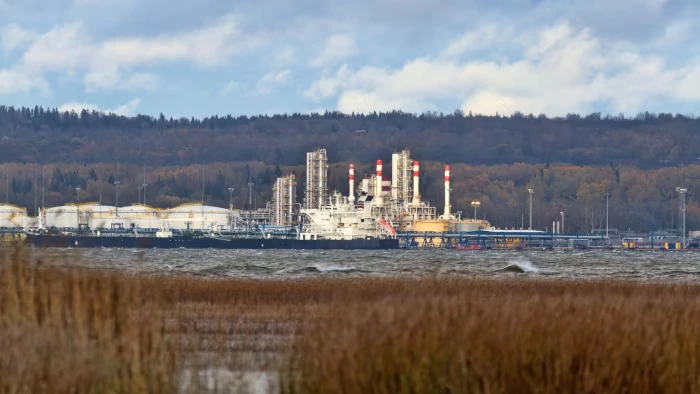Russian authorities are investigating yet another incident—already the sixth this year—involving an explosion on a ship operating in Russian ports. This time, an ammonia leak occurred aboard the Eco Wizard, a gas tanker owned by Greece-based StealthGas, during loading operations at the Baltic port of Ust-Luga. According to the Russian Ministry of Transport, a “minor ammonia leak” was recorded on July 6, caused by an “incident during loading and unloading operations.” All 23 crew members were safely evacuated, and no injuries were reported.
However, several Russian Telegram channels affiliated with law enforcement reported a suspected explosion as the real cause of the leak. As The Financial Times noted, the damage—particularly in the vessel’s engine room—suggests an external impact, rather than a cargo-related malfunction. One security expert told the paper, “This was almost certainly an attack. It appears to have been a commando-style raid deep inside Russian territory.”
The incident took place just nine days after a similar explosion aboard the Vilamoura, another Greek-owned tanker, in the Mediterranean Sea. The vessel’s owner later confirmed that the damage was caused by an unidentified explosive device. A statement issued at the port of Piraeus clarified that the damage was not internal in origin.
According to The Financial Times, a total of six suspicious explosions have occurred this year on ships collecting cargo from Russian ports. Most of the affected vessels are owned by Greek or Cypriot companies not under Western sanctions. The sole exception is the Koala, a crude oil tanker damaged in Ust-Luga in February and sanctioned by the EU in May for violations in the transport of Russian oil.
What all these incidents have in common is that the ships were loading cargo in Russian ports, though publicly available data suggests they were carrying non-sanctioned goods—such as Kazakh oil or, as in the case of the Eco Wizard, ammonia.
Among the speculated culprits are Ukrainian intelligence services. Yet Ukraine’s military intelligence directorate (GUR) has not issued any comment. Though the agency has claimed responsibility for previous daring operations inside Russia and in occupied territories, no evidence has surfaced linking it to the recent ship explosions.
What makes this string of events even more noteworthy is that the attacks are not targeting vessels from the so-called “dark fleet”—shady tankers with opaque ownership structures often used to circumvent sanctions. Instead, reputable shipping firms, such as Nasdaq-listed StealthGas, have become targets.
The scale of the incident triggered an official response. Just a day after the ammonia leak, Russian Transport Minister Roman Starovoit convened an emergency meeting. However, on July 8, he was dismissed by President Vladimir Putin. According to Kremlin spokesman Dmitry Peskov, the decree did not cite “loss of confidence” as the reason for his removal. Whether the dismissal was directly linked to the handling of the Ust-Luga incident remains unclear.
The broader picture is increasingly alarming. Experts suggest the attacks may be designed to undermine the very idea of “legitimate trade” with Russia, even when the trade itself doesn’t violate international sanctions. The uncertainty, combined with mounting risks, is likely to disrupt shipping logistics and intimidate vessel owners from engaging with Russian ports.
For now, it remains uncertain whether these are coordinated acts of sabotage aimed at Russian maritime infrastructure, or a series of incidents involving various actors—including some with alleged links to Libya, as speculated by certain analysts. What is clear, however, is that each new blast adds further fuel to the fire of geopolitical instability in the region.
This article was prepared based on materials published by The Financial Times. The author does not claim authorship of the original text but presents their interpretation of the content for informational purposes.
The original article can be found at the following link: The Financial Times.
All rights to the original text belong to The Financial Times.


















